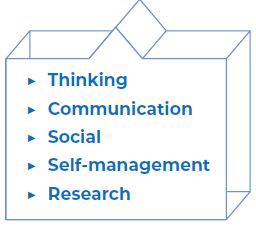We are committed to high-quality learning which we define as learning that goes beyond the academic life of students encompassing academic, social, physical, and community interests that result in shaping an individual who embraces learning throughout their life. It is engaging, with opportunities for self-direction, reflection, student voice, choice, and ownership. The learning is process-based and grounded in the real world, providing a platform for exploring diverse global perspectives. Our students are challenged to connect, extend, and transfer relevant knowledge and skills.

We derive high-quality learning from high-quality teaching which is:
- based on inquiry;
- focused on conceptual understanding;
- developed in local and global contexts;
- focused on effective teamwork and collaboration;
- differentiated to meet the needs of all learners;
- informed by formative and summative assessment.
Our students are encouraged to develop skills in the following Approaches to Learning (ATL) throughout their learning.

The International Baccalaureate Programmes
The International Baccalaureate (IB) Programmes aim to do more than other curricula. It develops inquiring, knowledgeable, and caring young people who are motivated to succeed. The IB gives students distinct advantages by building their critical thinking skills, nurturing their curiosity, and their ability to solve complex problems.
The Primary Years Programme (PYP)
Prepares students to be active participants in a lifelong journey of learning.
The PYP is designed for students aged 3 to 12. It focuses on the development of the child as an inquirer, both in the classroom and in the world beyond. It is a framework guided by six transdisciplinary themes of global significance, explored using knowledge and skills derived from six subject areas, as well as transdisciplinary skills with an emphasis on inquiry.
The Middle Years Programme (MYP)
Prepares students to be successful in school and to be active, lifelong learners
The MYP is designed for students aged 11 to 16. It provides a framework of learning which encourages students to become creative, critical and reflective thinkers. The MYP focuses on intellectual growth, encouraging students to make connections between their studies in traditional subjects and the real world. It fosters the development of skills such as communication, intercultural understanding, and global engagement – qualities that are essential for leading a meaningful life in the 21st century.
The Diploma Programme (DP)
Prepares students for success in higher education and life in a global society.
The Diploma Programme (DP) is an academically challenging and balanced programme that includes final examinations that prepare students, aged 16 to 19, for success at university and life beyond. It has been designed to address the intellectual, social, emotional, and physical well-being of students. The programme has gained recognition and respect from some of the world’s leading universities. The DP has been running successfully at OSC for over 20 years. It is a comprehensive rigorous, broad-based programme of study. Along with six academic subjects, students are involved in community service, engage in a piece of original research that culminates in an extended essay, and follow a philosophy course called Theory of Knowledge.
IB Learner Profile
All IB programmes aim to develop internationally minded people who, recognising their common humanity and shared guardianship of the planet, help to create a better and more peaceful world. IB learners strive to be:
|
|
|
|
|
|||
|
Inquirers They develop their natural curiosity. They acquire the skills necessary to conduct inquiry and research and show independence in learning. They actively enjoy learning, and this love of learning will be sustained throughout their lives. |
Communicators They understand and express ideas and information confidently and creatively in more than one language and a variety of modes of communication. They work effectively and willingly in collaboration with others. |
Knowledgeable They explore concepts, ideas, and issues that have local and global significance. In so doing, they acquire in-depth knowledge and develop understanding across a broad and balanced range of disciplines. |
Principled They act with integrity and honesty, with a strong sense of fairness, justice, and respect for the dignity of the individual, groups, and communities. They take responsibility for their actions and the consequences that accompany them. |
|||
|
|
|
|
|
|||
|
Risk-takers They approach unfamiliar situations and uncertainty with courage and forethought and have the independence of spirit to explore new roles, ideas, and strategies. They are brave and articulate in defending their beliefs. |
Open-minded They understand and appreciate their own cultures and personal histories, and are open to the perspectives, values, and traditions of other individuals and communities. They are accustomed to seeking and evaluating a range of points of view and are willing to grow from the experience. |
Reflective They give thoughtful consideration to their learning and experience. They can assess and understand their strengths and limitations to support their learning and personal development. |
Balanced They understand the importance of intellectual, physical, and emotional balance to achieve personal well-being for themselves and others. |
|||
|
|
|
|||||
|
Thinkers They exercise initiative in applying thinking skills critically and creatively to recognise and approach complex problems and make reasoned ethical decisions. |
Caring They show empathy, compassion, and respect toward the needs and feelings of others. They have a personal commitment to service and act to make a positive difference in the lives of others and the environment. |




